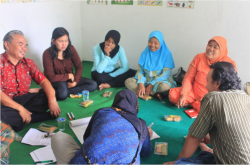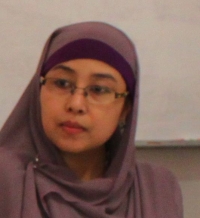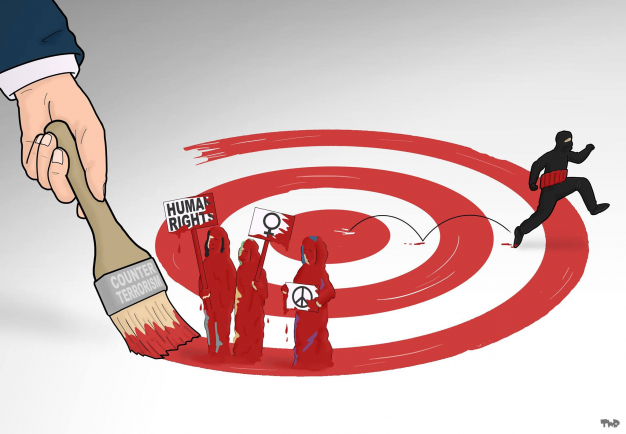By Dwi Rubiyanti Kholifah, AMAN Indonesia
On March 7, 2014, the President of Republic of Indonesia agreed to pass the Presidential Decree (PerPres) No. 18 2014 on the protection of women and children during civil conflict. This decree has been labeled as the Indonesian National Action Plan for the implementation of United Nations Security Council Resolution (UNSCR) 1325. The decree contains two major interventions. Firstly, it foresees in the protection of women and children during armed conflict, the protection of women and girls' rights and mechanisms of handling social conflict and violence, including treatment for victims and survivors of violent conflict. Secondly, it mentions empowerment, referring to efforts for strengthening human's rights, improving the quality of life of women and girls' affected by conflict and increasing the participation of women and girls in peacebuilding efforts.

Unlike other National Action Plans (NAP) for the implementation of UNSCR 1325, this PrePres is unique for it does not refer to UNSCR 1325 as its core legislation basis. To justify legislation in the field of Women, Peace & Security (WPS) in Indonesia, three other national legislations are at its core, as these are perceived to be less politically sensitive than UNSCR 1325. The PrePres refers to the Indonesian ratification of the Convention to Eliminate All Forms of Discrimination Against Women (CEDAW), the Indonesian ratification of the Human Rights Declaration and a Presidential Decree on Social Conflict Management.
The reason for referring to these national legislations is because the Minister of Foreign Affairs considered UNSCR 1325 not applicable for Indonesia “as a relatively peaceful country”. Two years ago, the different perspectives on UNSCR 1325 resulted in a heated discussion in the Regular Working Group Meeting on NAP 1325, leading to difficult negotiations between the Minister of Women's Empowerment and Children Protection and Minister of Foreign Affairs, and hindering the process of approval among the different Ministries. Instead of debating the UNSCR 1325 reference, we, as civil society, focused on the substance of the decree, taking into consideration national legislation covering the content of UNSCR 1325, with elements of prevention, protection, empowerment and participation of women in conflict reconciliation and peacebuilding. Eventually, all parties came to an agreement to reference to national laws to cover the content of UNSCR 1325.
The second unique element of the PrePres is the inclusion of children. The reason to add children as part of the decree is due to the technicality that children issues are within the mandate of the Ministry of Women's Empowerment and Children Protection. It makes it easier for government bodies to take legislation into consideration if it can be integrated into all programs of the Ministry. Also from a local Indonesian perspective, the inclusion of children as part of the national WPS agenda seemed necessary, since both women and children are most vulnerable to violent conflict and often overlooked within peacebuilding activities.
Taking into consideration these "deviations" from regular UNSCR 1325 NAPs, I believe that the local context must be taken into consideration in implementing the international WPS agenda. There cannot be one standard for national implementation of UNSCR 1325, since national contexts and the role of national actors should be taken into account. For effective implementation, collaboration between different kinds of civil society organizations is needed, together with cooperation with the national government. To overcome the challenge of integrating the international WPS agenda into national government policy, civil society organizations should be part of mechanisms with the responsibility to assist and monitor the implementation of the NAP on local, provincial and national level. International support is also needed to facilitate such processes.
 From 2005 to 2007 Dwi Rubyanti Kholifah joined the Asian Muslim Action Network (AMAN) as coordinator of the research fellowship program to assist Muslim young scholars conducting research on Muslim studies responding modernity and globalization. She went on to earn a MA in Health and Social Science at Mahidol University in Thailand. She is active in writing articles regarding women’s issue, minority’s rights, the role of women in peacebuilding for journals, online and offline media. She has been active in the women’s movement in Indonesia for years as a trainer, resource person and researcher on women’s human rights, religion and gender justice, and sexual and reproductive health. Currently, she is the director of AMAN Indonesia, which is concerned about women in relation to peacebuilding and inter-faith cooperation. In addition, she has been appointed to coordinate NGO forum in advocating freedom for religion in Indonesia. See also: http://amanindonesia.org/beranda.html
From 2005 to 2007 Dwi Rubyanti Kholifah joined the Asian Muslim Action Network (AMAN) as coordinator of the research fellowship program to assist Muslim young scholars conducting research on Muslim studies responding modernity and globalization. She went on to earn a MA in Health and Social Science at Mahidol University in Thailand. She is active in writing articles regarding women’s issue, minority’s rights, the role of women in peacebuilding for journals, online and offline media. She has been active in the women’s movement in Indonesia for years as a trainer, resource person and researcher on women’s human rights, religion and gender justice, and sexual and reproductive health. Currently, she is the director of AMAN Indonesia, which is concerned about women in relation to peacebuilding and inter-faith cooperation. In addition, she has been appointed to coordinate NGO forum in advocating freedom for religion in Indonesia. See also: http://amanindonesia.org/beranda.html
11 Dec '17 This month WPP staff interviewed Arbia Jebali and Sarah Chamekh from Free Sight Association in Tunisia about the work their organization does, how civil society space has changed over the years, which challenges they are facing now, and how civil society in Tunisia is organizing itself to overcome those challenges.
7 Nov '17 In this article, WPP staff interviewed Doron Joles of XminY Fund, an activist organization that supports social movements, action groups and changemakers fighting for a fair, democratic, sustainable and accepting world. He discusses the unique way they have chosen to hand out funds, and the challenges that go along with funding small activist organizations in the current global climate.

25 Oct '17 This Friday, the UNSCR 1325 Open Debate will take place once again, seventeen years since the adoption of landmark UN Security Council Resolution 1325 on Women, Peace and Security. In this article WPP staff reflects on the progress made for a truly transformative feminist peace agenda until now.
